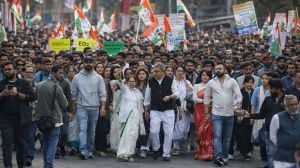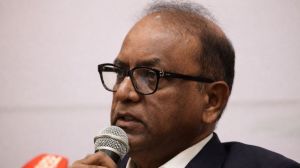Does anyone remember Abbas Tyabji?
In the Hindu-Muslim polarisation being fostered in Gujarat, the common heritage of the people is assiduously being erased from memory. One s...

In the Hindu-Muslim polarisation being fostered in Gujarat, the common heritage of the people is assiduously being erased from memory. One such legacy is that of Abbas Tyabji, known during the struggle for freedom as the Grand Old Man of Gujarat. Born in Baroda before the Indian Revolt of 1857, he retired as a Chief Justice of the Baroda High Court around 1913. He was an England-educated barrister, brought up in an atmosphere suffused with loyalty to the Empire. After some quiescent years, he was drawn into social struggles against untouchability attending, along with Gandhi, the Social Conference held at Godhra in 1917.
The Jallianwala Bagh massacre and military violence in Punjab as a whole in 1919 pulled Abbas Tyabji into the national movement. And there was no turning back. With the 1919 events having shaken up the country, Tyabji became a member of the committee set up by the Indian National Congress to inquire into the military violence. Other members of the committee included Mahatma Gandhi, C.R. Das and M.R. Jayakar.
The committee produced a famous report accompanied with voluminous evidence. Tyabji remained active in the Congress and all its struggles, presiding over the Gujarat Political Conference in 1920. Gandhi writes in his autobiography that it was under Abbas Tyabji8217;s influence that Gujarat accepted the non-cooperation programme even before the the Congress as a whole had done so. He was a signatory to the October 1921 manifesto, a bold document, calling upon Indians to withdraw from the civilian and military service of the Raj. Imprisoned often, the movement changed his lifestyle. He took to khadi, saying 8216;8216;this fakir8217;s dress has broken down all barriers8217;8217;. In the hot summer of 1928, when Tyabji was nearing 80, he went around Gujarat8217;s villages in a bullock cart popularising 8216;8216;the livery of freedom8217;8217;. A pity that even organisations like the Khadi and Village Industries Commission have done little to perpetuate the memory of people like him who did so much for the cause.
He had been active in the peasants8217; movement in Bardoli. In the civil disobedience movement of 1930, Tyabji succeeded Gandhi as the national leader after the latter8217;s arrest. A few days later he was himself arrested, leading a party of 59 persons to besiege the Salt Works at Dharasana. Before that he had been second in command of the Dandi march. Tyabji8217;s was a household name in the 1930s. One popular slogan of the movement then went like this: Khara rupaiya chandi ka/ Raj Tayab-Gandhi ka.
Tyabji had an affectionate relationship with Gandhi. An unending stream of letters was exchanged between them. Gandhi8217;s side of it alone stretches across 52 of the 99 volumes of his Collected Works. The correspondence deserves wider dissemination. The two are often like children exchanging notes: 8216;Dear Bhrrr!8217; start many of Gandhi8217;s letters. I once asked Sohaila, Tyabji8217;s daughter who is happily still with us, what this 8216;Bhrrr8217; was about. Apparently, Gandhi and Tyabji were held up one winter night at the Godhra railway station. It was so cold that they shivered and 8216;8216;bhrred8217;8217; each other to keep warm through the night; when the station master asked them what the matter was, they 8216;8216;bhrred8217;8217; him too! It became a private joke between them and sealed their friendship. A different Godhra in a different age.
The 8216;ever-smiling8217; Tyabji kept poor health in later years. Advised to spend more time in the hills, he moved to a cottage,8216;Southwood8217;, in Mussoorie, where he passed away in the night of June 9-10, 1936. The cottage was to be pulled down a few years ago. But the demolition was prevented by public protests. Now the Uttarakhand Freedom Fighters Association protects Abbas Tyabji8217;s legacy, even if Gujarat has seemed to neglect it. His grave in Landour was located after considerable effort last year. Tyabji8217;s wife Amina was also prominent in the freedom movement. A letter sent to the viceroy in the 1930s, on behalf of the women of India, is signed by her. Incidentally, a school for girls which she started in Baroda still bears her name.
A biography of Abbas Tyabji in Gujarati by Kalyanji Mehta, himself a prominent freedom fighter, is still extant. The finest photograph I have seen of the Grand Old Man is in The Fall of a Sparrow, the autobiography of his distinguished nephew, the late ornithologist Salim Ali.
A pity that even organisations like the Khadi and Village Industries Commission have done little to perpetuate the memory of personalities like him who did so much for the cause.
- 01
- 02
- 03
- 04
- 05































